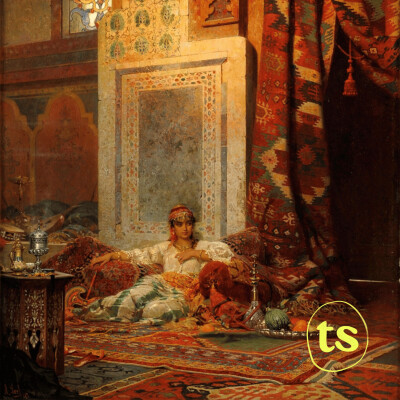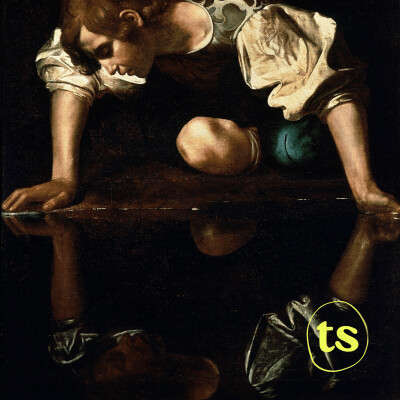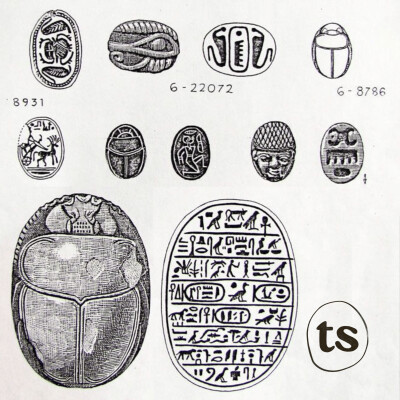GiuliaWhat if I told you, 'Beware, you should not be listening to my stories'. Would you continue listening to them? Maybe you would even more, wouldn't you? You would pause, look at me. Maybe you'd start slowly walking away. But your ears would still be alert, ready to catch a sound, a word, a sentence. And as I would start talking, you'd turn back to me, not able to resist. You dive into the rhythms and sounds of the narratives unfolding between you and me. This tiny magical place in which your senses grasp the words and everything happens in your mind. This is probably what happened in the medieval Arab world. Storytellers were magicians, bridges into different worlds. They said that stories were warnings to the curious. They knew the impact storytelling held. Stories are not meant to be forgotten. They are meant to stay, to transform oneself and the world. They can change the minds of mad kings, turn humans into stars or trees, and make people immortal. Thousands of years would mean nothing as long as stories remain. Time has no chance. Nothing will be forgotten. This podcast episode comes at a time when we all know mad kings, the modern ones, the ones who, sitting on their thrones, whisper secrets to their vizier. Secrets that transform into murmurs, into words, and into actions. The ones that destroy Earth, destroy life, extract more and more, leaving Earth empty. And we know it's in their hands, the future of humanity, of the nature we love most. Most of the time, no one tells them anything, because everyone is scared, scared of unleashing their wrath. Scared of losing what they have. One word could kill. Isn't that how we feel some days? We don't have kings anymore. But isn't that what they are? And I wondered, what shall we do? If I had asked that question in medieval Arab times, they would have told me, tell them a story. A long one. One that holds another story inside and then another, a tale within a tale. And probably they would have waved me closer and with a warm but quiet voice, once I smelled their spiced perfume, they would tell me the story of Shahrazad. But right before telling the story, they would say, 'Beware, you should not be listening to my stories'. The story I'm going to tell you comes from Malcolm C. Lyon's translation of the Arabian Nights, but I've changed it slightly for better flow and to speak to our modern minds. Before we dive in, if you're enjoying the episode please share it with those around you and rate this podcast five stars on Spotify or Apple Podcasts you can also leave a comment on the episode on Spotify I'd be so happy to hear your reflections that really helps and okay, let's dive in. Among the histories of past peoples, a story is told that in the old days, in the islands of India and China, there was a Sassasian king who had two sons: an elder and a younger. The elder ruled over the lands, treating his subjects with justice and enjoying the affection of them all. His name was King Shahriyar, while his younger brother, who ruled Persian Samarkand, was called Shah Zaman. For ten years, both of them continued to reign justly, until Shahriyar felt a longing to see his brother and sent off his Vizier to fetch him. 'To hear is to obey,' said the Vizier. And after he had travelled safely, he told Shah Zaman that his brother wanted a visit from him. Shah Zaman agreed to come and made his preparations for the journey. He came out, intending to leave for his brother's country. But at midnight, he thought of something that he had forgotten and went back to the palace. When he entered his room, it was to discover his wife in bed with a slave. The world turned dark for him, so he drew his sword and struck, killing both his wife and her lover as they lay together. When he got near his brother's city, Shahriyar came out to meet him and greeted him delightly. But Shah Zaman's heart was wounded, and as Shahriyar saw in his brother's eyes the sorrow he was trying to hide, he asked him, 'What ails you, brother?' And as Shah Zaman's eyes grew darker, Shahriyar pushed his questions aside, inviting him to come on a hunt. But he refused, and Shahriyar set off by himself. In the royal palace, there were windows that overlooked Shahriyar's garden. And as Shah Zaman was looking, a door opened, and out came fouty slaves, twenty girls and twenty boys. In the middle of them... was Shahriyar's wife. They came to a fountain where they took off their clothes, and the women sat with the men. The queen called a slave, and after they had embraced each other, he lay with her while the other slaves lay together. They spent their time kissing, embracing and drinking wine until the end of the day. When Shah Zaman saw this, he told himself that what he had suffered was less serious. His jealous distress ended, and he went on eating and drinking so that when Shahriyar returned and the brothers greeted one another, Shahriyar saw that Shah Zaman's colour had come back. You were pale, brother, Shahriyar said. But now you have got your colour back. So tell me about this. His brother explained: 'When you sent your vizier to invite me to visit you, I got ready and had gone out of the city when I remembered a jewel that was intended as a present for you, which I had left in my palace. I went back there to find a slave sleeping in my bed with my wife, and it was after I had killed them both that I came on to you, but don't make me say how I recovered.' Shahriyar, however, pressed him, and so Shah Zaman finally told him all that he had seen. 'I want to see this with my own eyes,' said Shahriyar. So the two brothers pretended, as last time, that Shahriyar went for a hunt. He secretly came back earlier and witnessed what Shah Zaman had described: his wife with another. Shahriyar was beside himself and told his brother to leave until they could find someone else to whom the same kind of thing would happen. They left and travelled for several days and nights until they reached a tall tree in the middle of a meadow, where there was a spring of water by the seashore. They drank from the spring and sat down to rest but after a time, the sea became disturbed and from it emerged a black pillar towering into the sky and moving towards the meadow. This sight filled the brothers with alarm, and they climbed to the top of the tree to see what was going to happen. What then appeared was a tall Jinni with a large skull and a broad chest carrying a chest on his head. He came ashore and went up to sit under the tree on top of which the brothers were hiding. The Jinni then opened the chest, taking from it a box, and when he had opened this too, out came a woman, as radiant as the sun. The Jinni looked at her and said he wanted to sleep for a while. When he started to sleep, the lady approached the two brothers and told them they must come out of the tree and lie with her. Otherwise, she would awaken the Jinni, who would then kill them. 'If you don't come up and do it, I'll rouse the genie against you,' she said. Shahriyar and Shah Zaman, reluctant but whose fear exceeded their distrust, finally gave in. The lady then told them she had been imprisoned by the Jinni to keep her chaste, but in his inattention had had many men whose seal rings she kept. 'What the Jinni did not know was that when a woman needs her sovereignty, nothing can get the better of her,' she said. 'As a poet has said, blame must be matched to what is blamed. I have grown big. But my offence has not. I am a lover, but what I have done is only what men did before me in old days.' Shahriyar and Shah Zaman gave their rings to her and left, thinking that what had happened to the Jinni was far worse than what had happened to them. When they came back to Shahriyar's city, they entered the palace and cut off the heads of the Queen, the slave girls, and the slave boys. Every night for the next three years, Shahryar would take a virgin, lay with her, and then kill her. This led to unrest among the citizens. Plants, trees, and flowers died. The waters of the streams that wove through their land turned dark and undrinkable. People fled with their daughters until there were no new nubile girls left in the city, apart from the Vizier's daughters, whom the elder was called Shahrazad, and the younger Dunyazad. Shahrazad had read books and history, accounts of past Kings and stories of earlier peoples, having collected a thousand volumes of this. She said to her father, 'Father, marry me to this man. Either I shall live, or else I shall be a ransom for the children of the Muslims and save them from him.' Her father was reluctant, but eventually took her to the king. When the king was about to lie with Shahrazad, she asked him to see her sister one last time and say goodbye to her. At that, the king sent for Dunyazad, who sat beneath the bed as the king lay with her sister. Then she asked her to tell a story to pass the waking hours of the night. 'With the greatest pleasure,' replied Shahrazad. 'If our cultured king gives me permission.' The king was restless, but when he heard what the sisters had to say, he was glad at the thought of listening to a story, and so he gave his permission to Shahrazad. And this continued every night for a thousand and one nights. King Shahryar began to rule as he once had, treating his subjects with justice. He started to win back their affection. The land prospered. Plants, trees, and flowers grew again. The water flowed in abundance, easing the thirst of both animals and people. Peace nested in those lands for hundreds of years. What happened in this story was the magic of storytelling. Something happened between the story and the King. It entered his body, softened his mind, his soul. Because stories heal the parts of us that need healing. Through characters, you understand parts of yourself. And through their transformation, you transform too. So Shariyar softened his heart and mind. He fell in love with Shahrazad, and he became a king who reclaimed the heart of his lands. It's not about forgetting the atrocities he committed, but about showing the audience, the listeners, that stories can transform anyone, even mad kings. At that time, stories were the holders of meaning, and laws. They had a mystical significance for how the world works. The stories of the Arabian Nights carried themselves through time, through vessels, ears, and mouths. Some of the stories Shahrazad tells the King are stories you've heard in your life: Sinbad and the Forty Thieves, Aladdin and His Magic Lamp. The collection of Arabian Nights drew from many cultures and sources: Persian, Indian, Greek. The knowledge was kept inside them. What I love about this story is that Shahrazad knew the words would win. She was hopeful. And this is how the art of storytelling works best. Storytellers know the stories they are going to tell will change something in those who listen. Because it changed something in them first. Also, something that caught me in that story is the fact that the characters feel better when they see that the same things happen to others. 'It's okay, the other is feeling worse.' There is a human tendency to compare ourselves to others, and even our suffering, to accept our own. But the story warns us that this can lead to more suffering and destructive behaviours. It can make us avoid hope and lose perspective on how we could cope and wish for better. If Shahrazad's stories conquered the king back to his senses, maybe there are some stories that could save humanity. When you think about it, Shahrazad didn't have much choice: tell a story, or die. The storytellers in the medieval Arab world, as they told Shahrazad's story, were not facing life or death themselves, but they were telling stories for their livelihood. If the people weren't interested in what came next in Shahrazad's story, they wouldn't get the money to survive. And Shahrazad wouldn't see the dawn. She'd die. And probably they would too. Like we eventually would. We are all telling a story to survive. To see the sun rise. The storytellers like to tell stories at night. They were 'the things of the evening'. And the stories mostly happened at night. Wasn't it because change would arise with the sun? Wasn't it because at night the transformation would happen, our eyes closed, our imagination filling dreams, entangling minK knots and soothing the heart? But this I cannot tell you. Some mysteries of the Arabian Nights were never solved, and they were destined never to be. Like Shahrazad, I am hopeful. I know we hold the oldest and most powerful tool. We just have to remember how to use it. We must align on the stories we want to shape. Do we want to continue telling stories about conquest? Humans disconnected from nature? Creating new mad kings? Or do we want to build worlds where we see ourselves thrive one day? What are the stories we will tell our children? the future kings and q'ueens of our world. Let's rewind our stories and myths. Let's reconnect to their deepest meanings of connection, kinship and love, not only within us, but within the natural world. Let's break this pattern of separation, conquest and superiority. When we tell a story, let's broaden the experience, not only to the main character, 'the hero', but also to the land, the plants, the trees, the living world. Let's give them a voice. Let's show how the stories and actions impact on communities, on the world, on life. Let's put humans back in their place, among all other living things, totally dependent on their big earthly family. Remember what the Vizier said to Shahryar, 'To hear is to obey.' To hear is to obey. It really made me think, giving your time, your energy to something is already co-creating. It's changing your mind, shaping your thoughts, moving you to act. I recently had a conversation with a dear friend about the power of words. A word already carries a story, of a people, of a culture. No word is ever chosen randomly. And this friend pointed out how often we use hard masculine words, words of conquest, of war, 'penetrating' into a place, 'killing it' when we talk about succeeding, 'a shooting' for taking pictures, or expressions like 'the hill I'm willing to die on' or 'to have more than one string to your bow'. Just a word reveals something about the word we carry behind our eyes, and it will shape the vision of those we speak to. Let's reflect on the words and stories we want to hold, those that will shape the world we envision, take root and flourish within us. As Ocean Vuong, poet and author, said on the 'On Being' podcast, 'The future is not in your hands, it's in your mouth.' Thank you for listening to this podcast episode. I hope it resonated with you. If it did, please share it with those around you and rate it five stars on Spotify or Apple Podcasts. You can also leave a comment on the episode on Spotify. I'm always very happy to read your reflections. I'm curious also to know which part spoke to you most in this story. So don't hesitate to share that too. I wish you a beautiful day or evening and I'll talk to you soon.





